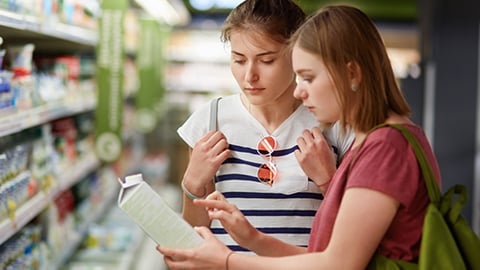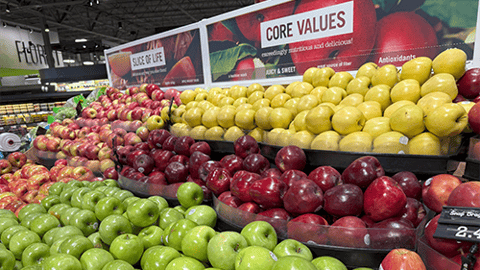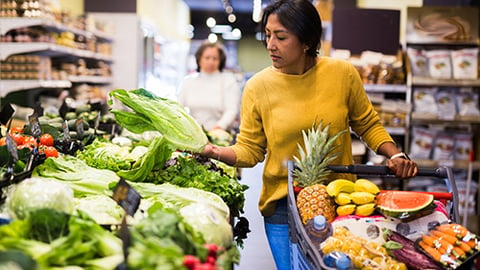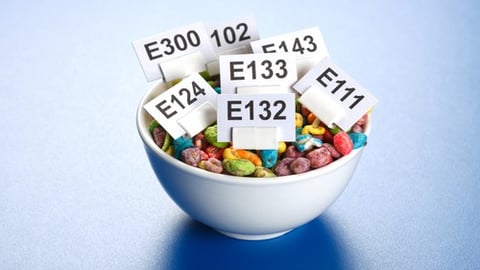EXCLUSIVE: Kroger Gets Serious About Improving Health Outcomes
While many grocers wouldn’t invite their competitors to collaborate on ways to improve health outcomes in the United States, The Kroger Co. is doing just that this week through its inaugural Nourishing Change Conference in Cincinnati.
Kroger Health President Colleen Lindholz spoke with Progressive Grocer during the event about how the food retailer is creating change within its own ecosystem, and stressed to the conference audience that it wants to collaborate across the grocery and health care industries to keep that momentum going.
The food-as-medicine movement, which has become a cornerstone for many players in the grocery industry, has been around for many years, but as Lindholz shared, Kroger is now focusing on personalizing it for customers based on their current life journeys, from a young person seeking maximum performance in sports to midlife and beyond.
One way Kroger is doing that is by providing FoodHealth Company's (formerly bitewell) FoodHealth Score to its customers nationwide, helping them instantly identify foods that align with their health goals. The scoring system seeks to give customers a fast, reliable way to evaluate the healthfulness of their food, and can be viewed while shopping online or within the Kroger app. Customers can also access the FoodHealth Score in-store by scanning a product's UPC codes.
“We're bringing simplified tools to the market and I think that's the key – helping people make healthier food choices and making it easy for them,” she said. “With our nutrition scoring system that we've been working on for quite some time, it's easier now for customers to shop commodities like cookies, crackers, yogurt, cereal, and things like that, and to better understand from a nutritional value standpoint which one's better for them.”
Lindholz said that while Kroger doesn’t have it all figured out, partnerships like the one with FoodHealth Company, have been an important part of bringing its customers the tools they need to help improve health outcomes. Additionally, she hopes broader adoption of those tools will spur even better outcomes across the country.
“We aspire that a nutrition scoring system would be used by all grocers in this country, that we would be able to have more transparency around food,” she explained.
Beyond that personalization and outside collaboration, Lindholz believes having the right health care professionals available at the right time is important for Kroger’s customers, which is why the grocer has dieticians on its staff. Those dieticians can meet customers where they are, whether it’s in the grocery aisles or online from the comfort of their own homes.
Dieticians can help shoppers figure out the right foods for their needs, and also help them with recipes, preparation and even food storage. They can also help people understand how small changes in their diets can make a big difference.
Gamification and rewards around healthier eating is another area where Lindholz sees Kroger making inroads.
“How can we make healthy eating and living fun and where it becomes a part of people's DNA, where it doesn't seem like a chore, but it's a choice to begin with? Ultimately it leads to people feeling better, living better lives, people not missing time at work,” she said.
In the end, it’s an interconnected process that starts with not just medicine, but the management of chronic disease through food.
[RELATED: Grocers Weigh In on Food as Medicine]
“It's a really big deal and our country's in a lot of trouble,” Lindholz said of chronic disease. “About half the people in the United States have or are conflicted with a disease that is diet-related and that's a shame. We need to do something about it. So from transformation of the food system to making it easier for people to understand all the way to rewarding people for doing that.”
As for the future, Lindholz believes better health outcomes will come from a true understanding that everyone is very different, and they have different needs based on where they are in their personal health journey. Just as someone has a unique fingerprint, Lindholz says they should also have their own “food print” to help map out their individual needs.
“That food print would exist for each individual, although it may change in life depending on what you're afflicted with, whether you come down with cancer or diabetes, or maybe you're going through some stressful times in your life. I think we haven't quite got to that, but I think it's going to be very interesting.”
Cincinnati-based Kroger serves more than 11 million customers daily through a digital shopping experience and retail food stores under a variety of banner names. The grocer is No. 4 on The PG 100, Progressive Grocer’s 2024 list of the top food and consumables retailers in North America. PG also named Kroger one of its Retailers of the Century.






